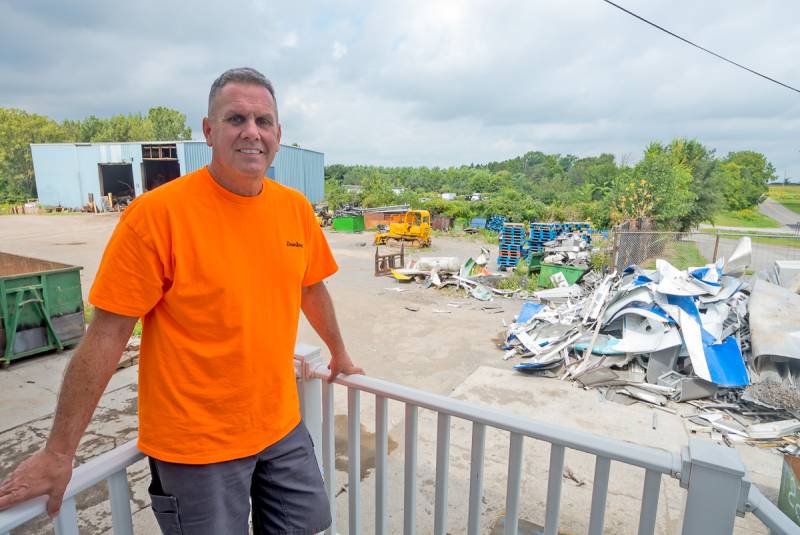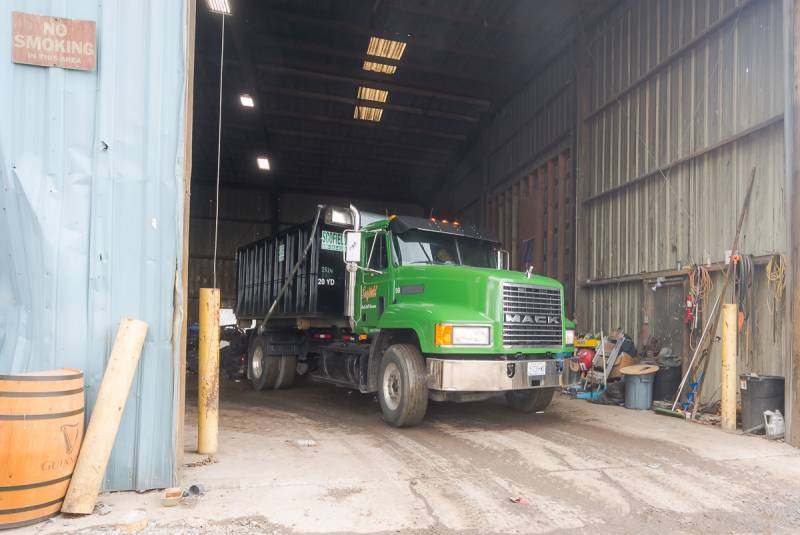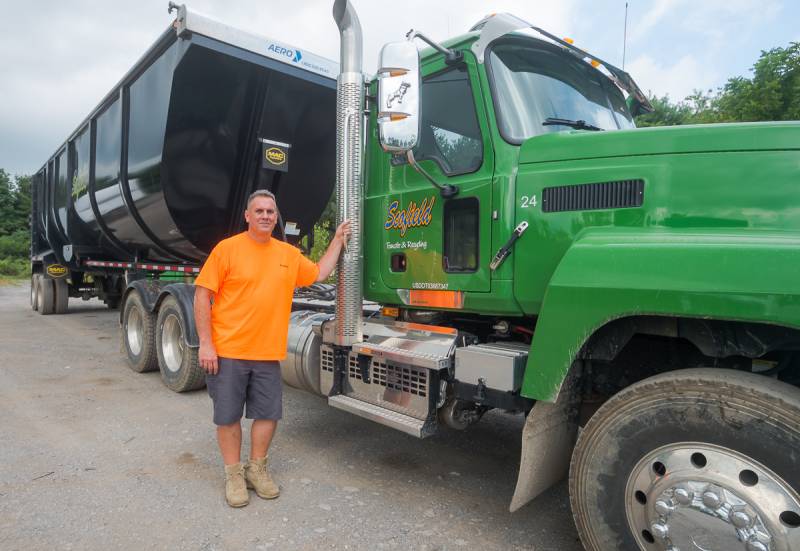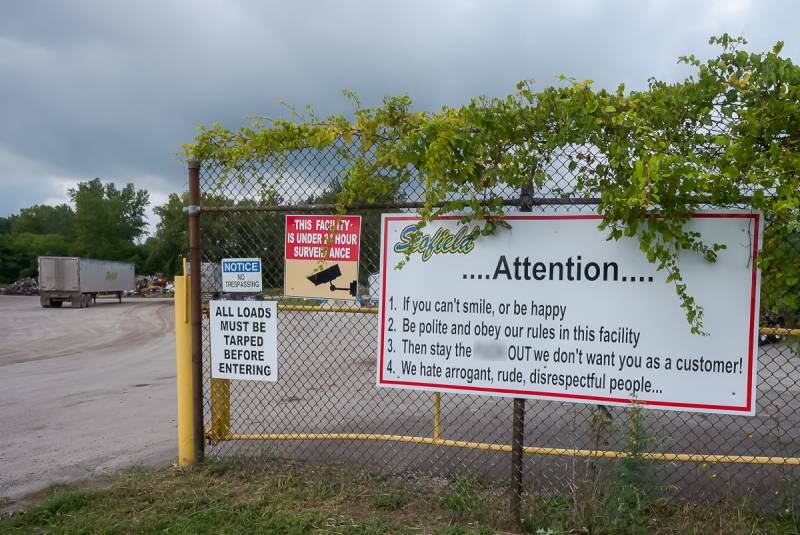
Photo by Howard Owens.
As a small business owner, Bruce Scofield says trying to operate in the great State of New York is like being part of an abusive relationship.
You know it's wrong and bad for you, but you can't give up the relationship.
"Everybody else can recognize it, but in your heart, you're hoping it gets better," Scofield told The Batavian on Wednesday. "Maybe that's a bad analogy, but in my eyes, it's a great analogy for being a New York State business owner. It's an abusive relationship. You love (the state). It's not the perfect thing but you're always hopeful it will get better."
The latest slap in the face for Scofield, the founder and owner of Scofield Transfer & Recycling in Stafford, was a call from his Mack truck dealer.
The stark message: Don't expect to ever again be able to buy a diesel truck in New York.
The reason is a new state regulation that aims to decrease the number of carbon-emitting trucks on the roads in favor of fully electric vehicles.
It's not that diesel trucks aren't still being sold in New York; they're just a lot harder for a small business owner to buy. New regulations favor fleet buyers, large companies that buy multiple trucks annually. The guy who only buys one truck every two or three years has been pushed to the margins.
Under the new rules, truck dealers must ensure that 10 percent of all new trucks sold are electric.
"'When we sell one electric truck,'" the dealer told Scofield, "'we get one credit, and we can take that one credit and turn around and sell a diesel motor fuel truck.' He says, 'But if we can also take that one credit,' and he used (a large grocery chain) as an example, just as a matter of speaking, and he said, 'Just say, (the chain) wants 10 trucks?' He says, 'We can use that one credit and sell one customer, a fleet of up to 10 trucks off of that one credit.' He said, 'So if we get one credit, who do you think we'll use it for?' He says, 'Do you think we're going to use it on Bruce Scofield or we're going to use it (for the fleet customer)?'"
The dealer told Scofield, "Your chances as the law reads now of ever getting a brand new truck again -- it will never happen. It's slim to none because we can't use that credit for you."
Scofield isn't against electric vehicles. He accepts the threat of climate change. He just doesn't think the current technology is practical.
An electric truck is $600,000 to $650,000, compared to up to $400,000 for a diesel. Then Scofield would need to buy a charge station. A charger that takes 12 hours is $50,000. A charger that takes six hours is $150,000. He would also still need to buy a packer for the back of the truck, which is another $200,000.
Then, the truck would need to be charged every 100 miles.
"In my situation, our trucks go 300 to 400 miles every day," Scofield said. "They haven't perfected it yet. If they had it perfected where they could go 300 or 400 miles, I'd be the first one to have electric because it's hard to find mechanics. In the grand scheme of things, if they ever do, it'll be a great thing, yeah, but they're trying to ram something down our throat that isn't perfected yet."
Scofield said he understands the need to reduce carbon emissions. That isn't his issue with the mandate.
"I'm all for the environment, you know," he said. "I want our environment for my grandchildren. A lot of things, such as when I do things for the County Fair (for example), that's not for me; that's not for publicity. I've got little, young grandchildren. I want that fair thriving, so when they're 8, 10, or 12 years old, things are just rocking, and they have that thing going, that they have the fair sustaining, like when I was a kid, you know. So a lot of my thinking at this stage of the game is for my future generations."
A new business challenge to overcome
Scofield grew Scofield Transfer & Recycling from the ground up, so he's not daunted by challenges.
After selling an oil business, he became a landlord and was shocked to find that Waste Management charged $500 for a Dumpster roll off.
He figured if somebody came with a Dumpster roll off that was half the size, "they would sell like hotcakes."
"I started with one truck and four boxes and within two weeks, I had 10 boxes," Scofield said. "Now between Dumpsters and roll offices, I'm over 1,000."
He employs more than 20 people. His son Tyler is now a partner in the business.
When he decided to expand, it wasn't easy. He decided to buy a shuttered transfer station in Stafford owned by Waste Management. The purchase agreement took two years to negotiate, and WM dragged its feet.
He said he boycotted WM, not hauling garbage to the company's facility. That got their attention.
When he got a call about it, he told the company, "You guys screwed me on this transfer station that you said you were going to sell to me."
A local manager decided to help get the deal pushed through with upper management.
Then, it took two years to jump through the state's regulatory hoops and get financing. The state required a $50,000 deposit on any potential fines.
He had difficulty convincing a regional bank to give him a loan. Eventually, he secured $75,000 from the bank and a $75,000 low-interest loan from the Genesee County Local Development Council (part of GCEDC).
He was raising his son alone at the time.
"When I opened this place in 2011, I was flat broke," Scofield said. "I was hauling fuel by five-gallon pails. That's how broke I was. I shut off the cable in my house."
The industrial development agency was particularly helpful in the process, he said. He gives VP of Business Development Chris Suozzi all the credit.
"They were huge, and (Suozzi) was instrumental in getting me financing for that."
He also received tax abatements through GCEDC for construction costs.
He said that he pledged to create five new jobs within five years, and he blew past that goal.
With that background, Scofield isn't intimated by the new state mandate.
"You know," he said, "I'm going to be crafty enough. I'm going to buy used trucks, or I'm gonna go out of state, even if I have to start a business in Ohio just as an entity; I've got friends out there that they've got a commercial location, so I'm always gonna be crafty enough to get around it. But why should we, as business owners in New York State, have to do that?"
Not public knowledge
Scofield doesn't think the new rules have been widely publicized and a lot of people haven't learned yet what the impact will be on New Yorkers.
This was perhaps illustrated by a conversation he had with Tim Hens, county Public Works commissioner, after a Wings Over Batavia committee meeting.
Hens did some "napkin math" and figured out that, at a minimum, the new regulations could cost the county $40 million. Hens confirmed the conversation with The Batavian.
"I wouldn't have known this if it didn't pertain to me," Scofield said. "It's not public knowledge. "There wasn't any publication. Nobody knew about it. They did it with the swipe of a pen without any understanding of what's going on."
It's that lack of forethought that bugs Scofield the most. He's willing to accept sensible rules. Without the proper forethought, he suggests, this isn't one of them.
He understands that not all regulations are inappropriate. The waste management business is one of the most regulated in the state. The regulations help make him a better operator, he said. He understands why they exist.
"Every law that the state puts on me to run this business, I agree with 100 percent," Scofield said. "I don't feel like all the state's against me. I understand it. I comply with it. I agree with them. So I'm an advocate for the laws they put on me, but a lot of times, the customers don't understand. So like coming in, we can't allow untarped loads, and I enforce it to the hilt. A lot of people will come in and think they're entitled or they don't have to do it next time. No, I say, 'My daughter-in-law is going down the road with my grandchildren in the car -- do you think because you're lazy, that I want stuff flying off at her to get in an accident and kill my grandchildren? That's how seriously I take it, but they want to argue back."
He has a sign at the entrance to the transfer station that invites customers who don't want to follow the rules or be rude to take their business elsewhere.
So, like any troubled relationship, his with New York is filled with mixed emotions.
He loves the people and the community here. He doesn't think the small-town values of Genesee County can be found in Florida or Texas. He helped Le Roy Ambulance raise $40,000 for a new ambulance. The community pulling together like that isn't happening in a lot of other places, he said.
"I don't want to go anywhere, and I'm free to fold up my tent and go wherever I want. I choose to be here," he said. "It's just a great area. I love the area."

Photo by Howard Owens.

Photo by Howard Owens.

Photo by Howard Owens.
